What Happens If Your Property Is A “Total Loss”?

Florida homeowners know that a variety of different types of storms hit the state every year. Tornadoes, hurricanes, and tropical storms are just a few of these and they can cause devastating damage to a property. At times, storms can be so severe that a property is deemed a “total loss”. So, what does this mean and what can you do if your property is classified as a total loss? Below, our Daytona Beach storm damage lawyer explains further.
Understanding what Constitutes a Total Loss
Properties are deemed to be a total loss more often than many homeowners would like to believe. When this occurs, it means it is not financially practical to repair the property because the cost would be far greater than simply rebuilding a new property. Insurance companies will typically classify a property as a total loss if the cost to repair it is greater than what the home is currently worth. In these instances, the insurer should pay out the full coverage available in your policy so you can rebuild the property.
The Process Appraisers Use to Determine Total Loss
To determine if your property is considered a total loss, the insurance company will send an appraiser to physically view the property. While making observations, the appraiser will look for two key considerations to determine if it is worth repairing the property rather than rebuilding. These are as follows:
- The identity test: The appraiser will determine if the property still resembles a home. If the property can still be identified as a dwelling, it may not be a total loss. However, if the appraiser determines that the property is no longer identifiable as a dwelling, it is considered a total loss.
- The constructive total loss test: The appraiser will also determine if the property currently meets the state and local property, safety, and health codes. If the property does not meet certain codes, it may be considered a total loss, particularly if it is no longer recognizable as a dwelling. If the property damage is not enough to place it in violation of certain codes, it may not be a total loss.
Will the Insurance Company Pay Out for a Total Loss?
If the insurance company has determined that your property is a total loss, they are required by law to pay you the full amount of coverage provided by your policy. However, it is important to note that in order for this requirement to apply, your policy must cover the total loss.
For example, most insurance policies do not cover flooding. You must purchase additional or separate insurance for this type of damage. As such, if your policy does not provide coverage for the specific type of damage, the insurer is not responsible for paying out for the total loss.
Contact Our Storm Damage Lawyer in Daytona Beach if Your Property is Deemed a Total Loss
At Bundza & Rodriguez, our Daytona Beach storm damage lawyer can help you hold your insurer accountable if they are refusing to pay out for a total loss. Call or text us today at 386-252-5170 or chat with us online to schedule a free consultation with one of our attorneys and to learn more about your legal options.
Source:
leg.state.fl.us/statutes/index.cfm?App_mode=Display_Statute&URL=0600-0699/0624/Sections/0624.155.html

